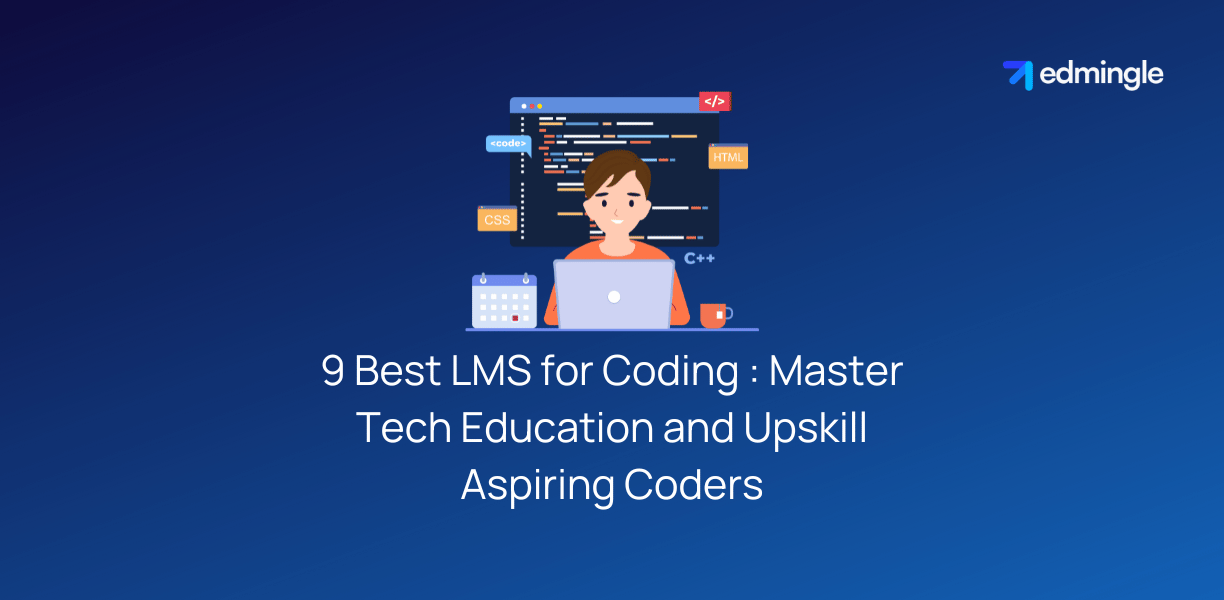
The tech landscape is fast-paced & constantly evolving. Modern technologies are fast gaining traction & getting obsolete.
In this age of digital revolution, coding isn’t just a skill—it’s a superpower!
And if you’re an aspiring coder or an educator seeking to empower tech wizards, then you’re at the right place.
To stay updated with relevant skill sets, a right LMS for coding lessons can be your secret weapon.
In this comprehensive guide, we’ll talk about the value an LMS brings to the coding training industry while unveiling the “9 Best LMS Platforms,” each curated to skyrocket your coding skills towards tech mastery.
What is an LMS for Coding?
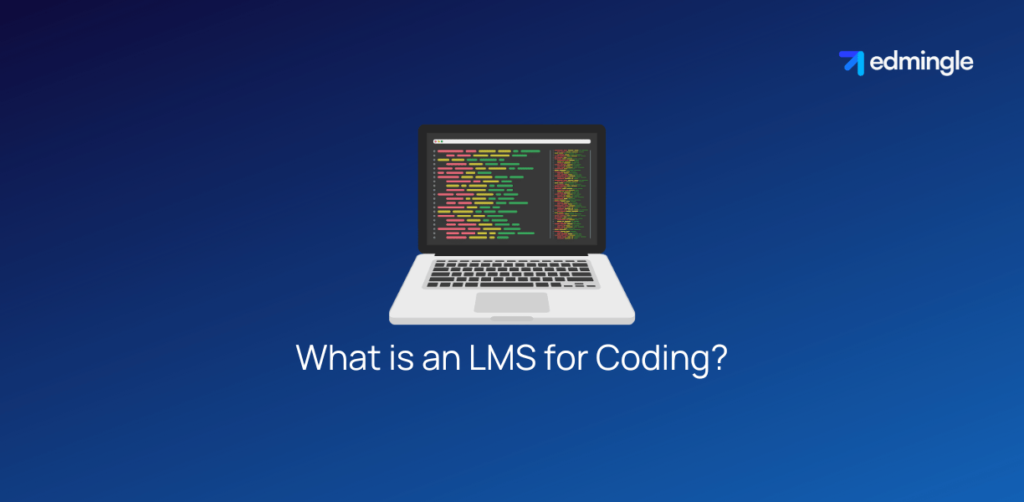
A learning management system for coding is a specialized online platform designed to facilitate the learning and teaching of programming and coding skills.
It acts as a virtual classroom, providing a structured environment where learners can access coding materials/courses, tutorials, and resources.
These systems often include interactive features like coding exercises, quizzes, and projects, allowing users to practice and apply their coding skills in real-time.
They typically come with almost all the features of an LMS like progress tracking, feedback mechanisms, and community support.
Thus, making them ideal for both self-learners and coding training academies/institutions seeking to enhance their coding course offerings.
Essentially, an LMS for coding is a comprehensive tool that bridges the gap between aspiring coders and the tech skills they need to master for personal or professional development in the digital age.
Role of an LMS in Coding Training
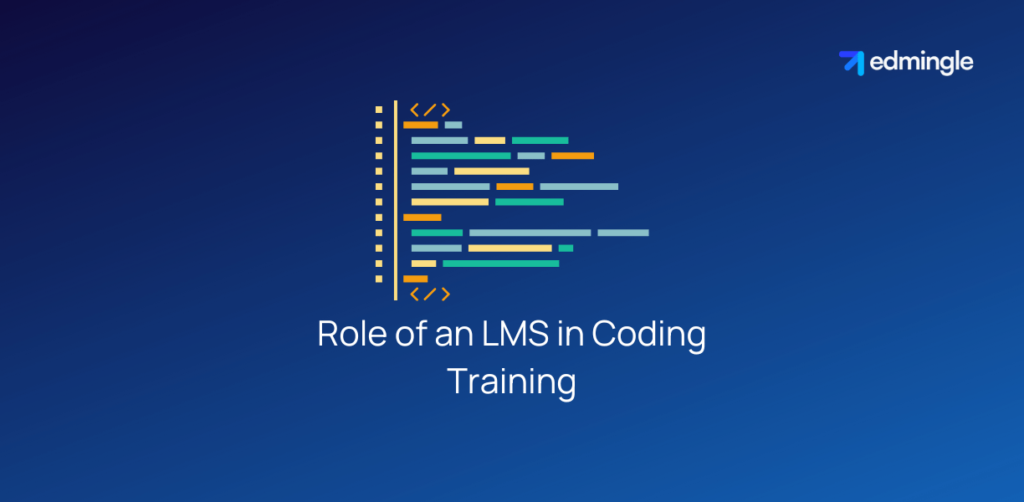
The following points discuss in brief the role a learning management system plays in imparting efficient & engaging materials for coding training programs or courses:
- It provides a structured and interactive platform for learning programming languages and development techniques while debugging and testing thousands of lines of code.
- It serves as a centralized hub for educational content/materials, including tutorials, video lectures, and coding exercises, enabling learners to progress at their own pace.
- It tracks individual progress, offering personalized feedback, quizzes and assessments to ensure mastery of complex coding concepts.
- Moreover, it facilitates a collaborative/social learning environment through chatroom integration, discussion forums and group projects, encouraging peer-to-peer learning and mentorship.
- For trainers and academies, an LMS streamlines the delivery and management of user accounts & coding courses, allowing them to efficiently scale training programs and monitor learner performance.
Overall, an LMS enhances the coding learning experience by making it more accessible, engaging, and effective for individuals and groups alike.
10 Benefits of an LMS for Coding for Aspiring Programmers
The benefits of an LMS for coding, especially for aspiring programmers, are multifaceted and significant.
The table below talks about them all in detail:
| 1. | Structured Learning Path | An LMS provides a well-organized curriculum, ensuring that learners cover all fundamental and complex concepts systematically. This structured approach helps in building a strong foundation in programming. |
| 2. | Flexibility & Accessibility | With an LMS, learning can happen anytime and anywhere, accommodating various schedules and learning paces. This flexibility is particularly beneficial for those balancing other commitments like work or school. |
| 3. | Interactive Learning Experience | Many LMS platforms offer interactive coding exercises, live coding environments, and real-time feedback, making the learning process more engaging and effective. This hands-on experience is crucial for understanding and retaining complicated concepts. |
| 4. | Progress Tracking | LMS platforms often include tools to track progress, set goals, and assess proficiency. This feature helps keep learners motivated and identify areas needing more focus. |
| 5. | Resource Richness | Aspiring programmers gain access to a wide range of resources, including video tutorials, documentation, forums, and webinars, all within the LMS. This vast repository of information is invaluable for deepening understanding and staying updated with the latest trends. |
| 6. | Peer and Community Interaction | Many LMS platforms provide discussion forums or communication tools for learners to interact, share knowledge, and solve problems collectively. This community aspect can be a significant source of support and inspiration. |
| 7. | Personalized Learning | Adaptive learning features in some LMS platforms can tailor the learning experience to the individual’s strengths and weaknesses, enhancing the efficiency of the learning process. |
| 8. | Real-World Application | LMS for coding often includes project-based learning modules that allow learners to apply their skills to real-world scenarios, thereby enhancing their problem-solving abilities and readiness for the job market. |
| 9. | Certification and Credentialing | Completing courses on an LMS can often lead to certification, providing formal recognition of the skills acquired, which can be valuable for career advancement. |
| 10. | Feedback and Mentorship | Some LMS platforms offer direct feedback from instructors or mentors, providing guidance, clarifying doubts, and helping learners overcome obstacles in their coding journey. |
For aspiring programmers, an LMS emerges to be a comprehensive ecosystem that supports their growth and development in the field of programming, equipping them with the skills, confidence, and credentials to succeed in the tech industry.
And if we’ve got you thinking about the power of feedback in e-learning, make sure to check our article here.
8 Key Features of an LMS for Coding
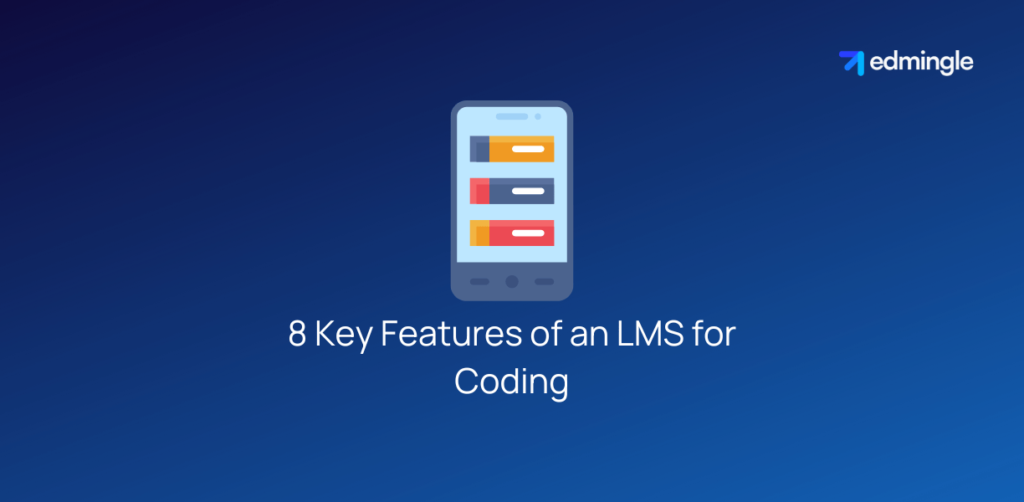
When considering an LMS specifically designed for coding, several key features stand out as particularly important when it comes cutting-edge technologies.
The following 8 features distinguish these platforms from generic learning management systems:
1. Integrated Coding Environment:
A crucial feature is an integrated development environment (IDE) within the LMS. This allows learners to write, test, and debug code directly in the platform, providing a seamless, real-world coding experience. It should also provide feature to post code comments.
2. Interactive Code Execution and Testing:
The ability to execute thousands of lines of code and see immediate results is essential. This feature enables learners to experiment, troubleshoot, and understand the practical application of coding concepts in real time.
3. Project-Based Learning and Real-World Simulations:
An LMS for coding should offer project-based learning modules that simulate real-world scenarios. This helps learners apply their knowledge in practical situations, preparing them for actual coding tasks in a professional setting. This further promotes active learning over passive.
4. Advanced Code Assessment Tools:
Unlike generic LMS platforms, an LMS for coding needs sophisticated tools to automatically assess and provide feedback on code written by learners. These tools should be able to evaluate the logic, efficiency, and accuracy of the code. Furthermore, such assessment tools should monitor activities strictly.
5. Version Control Integration:
Integration with version control systems like Git is vital. This feature acquaints learners with industry-standard practices for code management, collaboration, and tracking changes over time.
6. Language and Framework Diversity:
An effective LMS for coding should support a wide range of programming languages and frameworks, catering to diverse learning needs and keeping up with industry trends.
7. Comprehensive Resource Library:
A rich library of coding resources, including documentation, best practices, sample code, and tutorials, is essential for deepening understanding and supporting self-guided learning.
8. Mentorship and Expert Support:
Access to expert guidance, whether through mentorship programs, forums, or live support, is crucial for resolving complex queries and guiding learners through challenging aspects of coding.
These features collectively create a robust and conducive learning environment, tailored to the specific needs of coding education.
Is it Feasible to Build an LMS for Coding from Scratch?
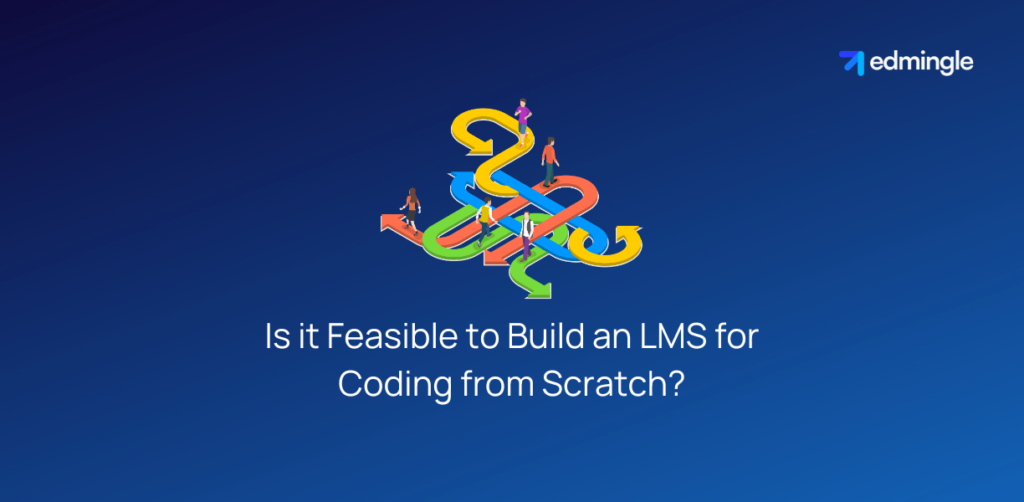
Talking about possibility & feasibility, yes it is. But, to what extent, is uncertain.
You see, developing an LMS from scratch comes with a lot of resources; developers, time, effort, money & patience.
And still, if that gets right, there are the additional costs; of maintaining & scaling it.
In a crux, building a market-ready LMS from scratch is going to cost you a lot of time, money and opportunities that you could’ve tapped into using a ready-to-launch LMS.
Which Programming Language is Best for an LMS for Coding?
Selecting the “best” programming language for a learning management system for coding largely depends on the target audience and the goals of the learning platform.
However, some languages are particularly well-suited due to their widespread use, ease of learning, and relevance in the industry:
| Python: Widely renowned for its simplicity and readability, Python is an excellent choice for beginners. It’s used in various fields, from web development to data science and machine learning, making it a versatile language to include in an LMS. |
| JavaScript: As the backbone of web development, JavaScript is essential for learners aiming to specialize in front-end or full-stack development. Its ubiquity in web applications and the availability of numerous frameworks make it a valuable inclusion. |
| Java: Known for its robustness and portability, Java is a staple in enterprise environments. It’s a good choice for an LMS focused on building foundational programming skills applicable in a wide range of professional settings. |
| C#: For LMS platforms aiming at game development or Windows-based applications, C# is a strong choice. Its integration with the Unity game engine makes it popular among game developers. |
| HTML/CSS: Though not programming languages in the strict sense, HTML and CSS are crucial for web development. An LMS that includes these technologies can provide a comprehensive learning path for aspiring web developers. |
| SQL: For LMS platforms with a focus on databases, SQL is indispensable. Understanding how to manage and query databases is a valuable skill across many IT disciplines. |
| Ruby: Known for its elegant syntax, Ruby and its popular web framework, Ruby on Rails, can be a great addition to LMS platforms focusing on rapid web development and startups. |
| Swift: If the LMS targets mobile app development, especially for Apple’s ecosystem, Swift is the go-to language. It’s powerful yet easy to learn, making it suitable for beginners and professionals alike. |
In short, the best programming language depends on the educational objectives and the intended audience. A well-rounded LMS might offer a combination of these languages to cater to a broad range of learners and objectives.
9 Best LMS for Coding in 2023
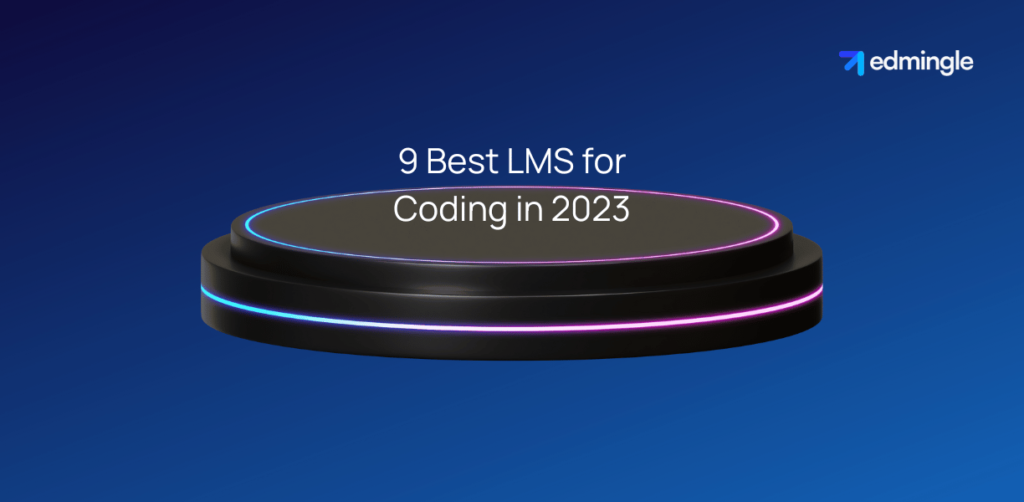
The world of coding education is evolving everyday, and growing with it, is the need for effective and comprehensive learning management systems (LMSs).
Here we mention a curated list of the 9 best LMS for coding in 2023:
1. Edmingle
Edmingle stands out for its user-friendly interface and comprehensive course management features. It’s tailored for both individual learners and educational institutions, offering a scalable & flexible learning environment that adapts to various teaching styles.
Its interactive coding exercises, seamless integration with Mettl and robust assessment tools make it a top choice for those looking to streamline their coding education.
To highlight its stand in the LMS industry, this SaaS LMS is today trusted by 5000+ training businesses including leaders like McGraw Hill, Aditya Birla Education Academy, MIT SDE and many more.
2. CodeHS
A favorite among educators and students alike, especially in K-12 education, its designed to make coding accessible & fun, with a focus on problem-solving & critical thinking. It has engaging content/learning modules and teacher resources.
3. Codesters
Codesters is uniquely designed to cater to middle and high school students. It combines the fundamentals of interactive coding platforms with drag-and-drop interface, easing students into text-based programming.
4. Codio LMS Integration
A comprehensive LMS integration, offering a seamless blend of coding tools and educational content. Its cloud-based IDE and auto-graded assessments provide an efficient learning experience. It’s emphasis on higher education makes it ideal for university-level coding courses.
5. TeachFloor
TeachFloor excels in collaborative learning & is perfect for cohort-based courses. It promotes interactive learning through live sessions & group projects. Its community-driven approach and real-time feedback system make it a dynamic platform for immersive coding education.
6. Element LMS
Focusing on simplicity and efficiency, it is ideal for smaller institutions and independent educators. Its straightforward design and intuitive interface make it a practical choice for streamlined coding education.
7. Mastery Coding
Mastery Coding is designed with a gamified approach to keep learners engaged. It emphasizes mastery-based learning, where students progress by demonstrating their understanding of each concept.
8. Empire Code
Known for its personalized learning paths and a wide range of programming languages. It caters to both beginners and advanced learners, offering courses that range from basic coding fundamentals to complex programming concepts.
9. CodeGrade LMS Integration
CodeGrade stands out for its focus on feedback and grading. It integrates seamlessly with existing LMS platforms, enhancing coding courses with its automated grading system and detailed feedback tools.
There is an abundance of platforms today. But which one is the best for you, depends totally on your needs and objectives.
How to Select the Right LMS for Coding?
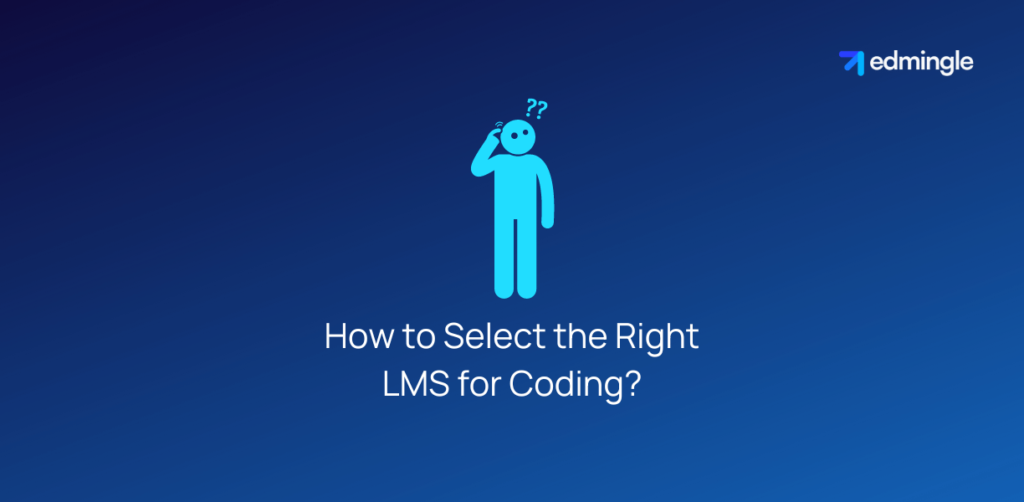
Now since you have all the information necessary for implementing an LMS for your coding academy/training programs, comes the part of selecting the right one.
And selecting the right learning management system) involves considering several key factors to ensure it meets your educational needs and goals:
- Curriculum and Course Content: Evaluate the depth and breadth of the coding curriculum offered. Ensure it covers the programming languages and topics relevant to your learning objectives.
- Interactive Learning Tools: Look for a learning management system that offers interactive learning tools like a built-in IDE, real-time code execution, and hands-on projects. This practical approach is crucial for effective coding education.
- User Experience: The platform should be intuitive and user-friendly. A good LMS will have a clean interface, easy navigation, and accessible content, making the learning process smooth and engaging.
- Customization and Scalability: Consider whether the LMS can be tailored to your specific requirements. This includes the ability to customize learning paths, add or modify content, and scale as your or your learners’ needs grow.
- Assessment and Feedback Mechanisms: Effective assessment tools are essential. Look for an LMS with robust testing and feedback systems that can accurately gauge learners’ progress and provide meaningful insights.
- Support and Resources: Adequate support, be it technical assistance, learning resources, or community forums, is important. Edmingle enhances the learning experience exceptionally-well with its customer support & service.
- Integration Capabilities: Check if the LMS can integrate with other tools and systems, such as version control systems like Git, or your existing educational tools and software.
- Cost and Licensing: Evaluate the cost structure and licensing terms. Ensure they align with your budget and the scale of deployment you’re planning. Make sure to check about the LMS pricing.
- Reviews and Reputation: Look for reviews, testimonials, or case studies. Feedback from current users can provide valuable insights into the LMS’s performance and suitability.
- Trial and Demonstration: If possible, use a free trial version or request a free demo. Hands-on experience with the learning management system will give you the best indication of its suitability for your needs.
By carefully considering these factors, you can select an LMS for coding that not only aligns with your goals but also provides an enriching & effective learning experience for your learners.
Conclusion
As we wrap up our exploration, it’s clear that the world of online coding education is rich with diverse and innovative options.
Today, there’s an LMS out there tailored to every specific need. The key is to identify the LMS that aligns best with your educational objectives, considering factors like curriculum content, user experience, customization, and cost.
Remember, the right LMS is more than just a platform for learning to code; it’s a gateway to new opportunities, a bridge to the future of technology education, and a companion in your journey towards becoming a proficient coder.
As technology continues to evolve, coding literacy becomes an ever more valuable skill.
FAQs on LMS for Coding
What is an LMS for coding?
An learning management system for coding is a specialized online platform designed to facilitate the learning and teaching of programming skills. It offers structured courses, interactive coding exercises, progress tracking, and often includes IDEs for a hands-on learning experience.
Who can benefit from using an LMS for coding?
An LMS for coding is beneficial for a wide range of users, including individual learners looking to enhance their coding skills, educators in schools/universities seeking to provide structured programming courses, and organizations aiming to train their employees in software development.
How does an LMS for coding differ from a general LMS?
Unlike general LMS platforms, an LMS for coding specifically focuses on programming education. It includes features like integrated coding environments, real-time code execution, specialized assessments for coding proficiency, and often project-based learning tailored to software development.
Can beginners use an LMS for coding effectively?
Absolutely. Many LMS platforms for coding are designed with beginners in mind, offering step-by-step tutorials, foundational courses in various programming languages, and supportive communities. They provide an accessible entry point into coding for those with little or no prior experience.
What should I consider when choosing an LMS for Coding?
When selecting an LMS for coding, consider the range and depth of programming languages and topics offered, the quality of interactive learning tools, the user interface and experience, customization options, cost, and the availability of support and resources. It’s also helpful to check user reviews and, if possible, try a demo or trial version.

Leave a Reply